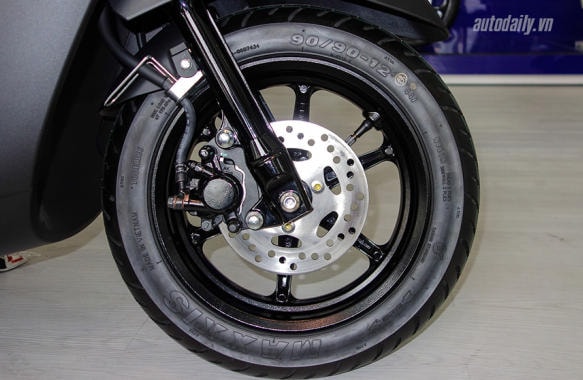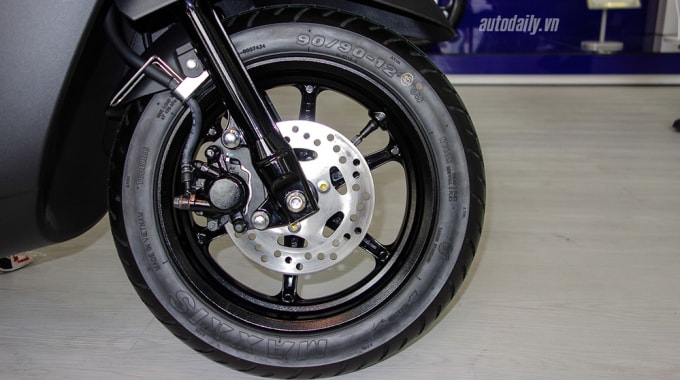Notes when using motorcycle disc brakes
Motorcycles with disc brakes are becoming more and more popular. When using a vehicle, you should also pay attention to some issues for your own safety and to prolong the life of this important part.
 |
| Disc brakes have a more complex structure and operation than mechanical motorcycle brakes. |
Disc brakes have a more complex structure and operation than mechanical brakes on motorbikes. The main parts of the system include the brake disc, main piston and slave piston, brake pads, oil pipes, brake levers and an oil pan with an oil level indicator.
The disc brake system has a closed operating principle between these parts. It uses the compression force of oil from the oil pan, through the pipe down to the piston to act on the brake pads, directly acting on the brake disc.
Disc brakes have much better grip than mechanical brakes because the force of the brake pads is perpendicular to the disc surface. Therefore, all other details of the disc brake must also have high precision and durability: Brake fluid is a specialized oil, not used with any other type of oil; the piston is plated on the surface; the oil seal is made of special rubber, no rust or oil leakage; the brake disc is made of steel; the brake pads are free of impurities and can withstand strong force.
Common problems
Quite a few people come to Motorcycle Repair Centers to repair and replace disc brakes because they see that the brakes are not working, there is a screeching sound... The basic reason why disc brakes are not working is usually because the cylinder in the brake has a damaged plating layer, leading to stuck pistons, causing the brakes to lock or become inert. In this case, a new piston must be replaced.
 |
| The phenomenon of disc brakes making a screeching sound comes from driving in the rain, sand and dust sticking to the brake disc. |
The phenomenon of disc brakes making a screeching sound comes from the cause: Due to driving in the rain, sand and dust stick to the brake disc. When squeezing the brake, the brake pads and the brake disc come into contact with each other, encountering a layer of sand and dust in the middle, creating a screeching sound.
Although the brake disc and brake pads have holes and grooves to drain dust, they will not be effective if too much sand and dust gets in. In addition, corroded brake pads and warped brake discs are also the cause of noise and, at the same time, destroy the entire braking system.
Use properly
Using disc brakes requires understanding its operating principles to be able to maintain it in time. Oil and brake pads are two accessories that must be regularly maintained or replaced when necessary.
Poor quality or dry brake fluid will lead to a series of other damages such as: piston damage, loss of coating, loss of force and tightness. Brake fluid must be used correctly, do not use other types of oil. Motorcycle brake fluid has many types such as DOT3, DOT4, SAE J1703, 70R3... each type of vehicle has its own type of oil and is usually written right on the oil tray.
 |
| Brake fluid and pads are two accessories that regularly need to be maintained or replaced when necessary. |
Worn brake pads not only cause loss of grip but also damage the brake disc. When the pad (the layer attached to the brake pad's iron bone) wears out, the brake pad when in contact with the brake disc will create high temperatures, warping and wearing out the brake disc.
You should note to change oil and brake pads based on the number of kilometers. Usually about 20,000 km change once, if it is the rainy season it may have to be changed sooner.
Regardless of whether it is a disc brake or a mechanical brake, it is essential to coordinate the front and rear brakes smoothly. Experienced riders advise pressing the rear brake before applying the front brake to avoid the bike rolling due to inertia.
With disc brakes, do not squeeze the brake lever all the way suddenly. Apply the brake lightly in a squeeze-release pattern. Never apply the front brake when entering a corner, as this will cause the front wheel to stop, the steering wheel to tilt, and the vehicle to easily slide and fall.
According to Autodaily
| RELATED NEWS |
|---|

